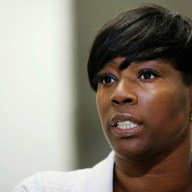 Director Justin Chadwick got to screen his film “Mandela: Long Walk to Freedom,” at the White House.
Director Justin Chadwick got to screen his film “Mandela: Long Walk to Freedom,” at the White House.
Credit: Getty
Director Justin Chadwick offers a fuller picture of Mandela’s life than has previously been shown in TV and film with “Mandela: Long Walk to Freedom,” including glimpses into the world leader’s troubled younger days and the trials of his wife, Winnie, during his incarceration.
You just got to screen this film at the White House. Not too shabby.
I mean, what an honor. Just a completely humbling experience. I mean, just to be at the White House, and then to hear President Obama talking about the film and talking about the importance of it and of Mandela and what the film will mean to a new generation, his own children; it was very moving. And inspiring. What a man. It was a brilliant, brilliant, brilliant night, and my wife and I, we couldn’t sleep. We got up the next day like, “Did it really happen? Can you believe it?”
It’s not the type of thing you do for just any movie.
Someone told me that Harvey [Weinstein] hadn’t done a White House screening since “Good Will Hunting,” which is pretty amazing.
Still, it had to be less intimidating than showing the film to Winnie Mandela.
I have to say, I didn’t know as much about her. I had the perception of Winnie Mandela that was through, really, the western British press that I’d read when I was a student and in subsequent years. I met her a few times in my research. The first time I was only supposed to go around there for a cup of tea and I ended up spending six hours. There’s kids constantly running around the house, she always had a great-grandchild on her knee — just the sound of children and the being with children and how important family was. Her two daughters had said to me that the thing the government had done at the time was they always arrested her and incarcerated her just before the children came home from school. She had 17 months of solitary confinement at 23 years old. It felt very important to show both sides. I mean, it is Mandela’s story, but it felt very important to show what happened to Winnie on the outside.
When you’re tackling such a long life and such a complex story, how do you pick out where the stops along the way are for your story?
It’s the “Long Walk to Freedom,” so it was his book. It had to start with him as a boy. It felt appropriate to show the whole story. And because we were going for a personal take and to explore him as a man, flaws and all, we had to show Mandela behind closed doors — him as a father, him as a husband, him as a young man. And the film deals with a pernicious racism that is still present today, but Mandela actually shows a way of what to do with that hatred and what to do with that anger as a person.
You also had to deal with covering his life from a boy to an old man. Did you think about using multiple actors for the adult Mandela?
The producers initially talked to me about the idea of big Hollywood stars to [potentially] play the role of older Mandela, and right off I wanted one person to play as much of it as possible. I mean, there’s three Mandelas in mine, but it felt like for the majority of the film there should be one person for the audience to identify with. If we could find a way of doing the age, then we would be able to stick with one actor. It’s something I was really keen about, but it was something that was a bit nerve-wracking as well because Idris [Elba] is a very instinctive actor, a very immediate actor. I didn’t want to lose the subtlety of his performance underneath makeup.
















